I love my mum, but like a lot of old people she believes some pretty insane things. For one: that Brexit won’t ruin the UK. And also: that there might be some truth to the Flat Earth theory, that wacky philosophy espoused by rapper B.o.B and, it turns out, an alarming number of other fully grown adults.
A primer on Flat Earth theory: believers believe that the Earth isn’t a round sphere, but a flat circle neatly surrounded by huge impenetrable ice walls.
Videos by VICE
Slightly bizarre, yes, but is it really such a crazy idea? I’ve never seen Earth from outer space with my own eyes, so technically I’m putting all my trust in other factors: photos, videos, mountains of evidence and the expertise of scientists and institutions like NASA – none of whom have any reason to lie about such a thing. So, actually, yes: it does seem a little crazy.
This, of course, is where one of the main Flat Earther arguments lies: as a group, they’re big into observable facts, preferring to do their own research rather than blindly trust the “experts”. My problem, though, is that – in doing my own research – everything I’ve found has just further convinced me that the Earth is a sphere.

As part of that research, I asked my mum why she believed. “This subject has been written about over the years by people who have studied it in earnest, but their work was disregarded because only a few people read it,” she explained. “With the internet, it’s available for people to reflect on. It’s something that I never thought to question, which I think is fascinating not just scientifically, but emotionally and spiritually.”
This, perhaps understandably, wasn’t quite enough for me – so when I saw there was a Flat Earth convention happening in Birmingham, the first of its kind in the UK, I decided to go with my mum to see if a whole room full of people like her could change my mind, and to find out how exactly they came to believe in a theory which has been so routinely rejected. Unfortunately, after buying her a ticket and everything, my mum was too ill to go on the day, so I went by myself.
I arrived at the venue – a Jurys Inn hotel – on a wet Saturday morning, to discover that the event was essentially a small carpeted convention room boasting a few cameras, some stalls selling Flat Earth merchandise and 70 or so attendees watching Powerpoint presentations beamed onto a wall.

As I entered, I was offered a gift of “fluoride free” toothpaste. This made perfect sense, given the location. A popular conspiracy theory states that governments across the world have been putting fluoride in our water supply to tranquillise the masses, despite the fact the only piece of “evidence” for this theory – which involves both the Nazis and the Communists – has been widely discredited.
With the tone set for the day, I sat down to watch some speeches.

The speakers all seemed well aware of how “Globe-Earthers” view the Flat Earth theory, i.e. ludicrous, and their talk of the current scientific establishment felt very “us versus them” – a nice bit of truther tribalism.
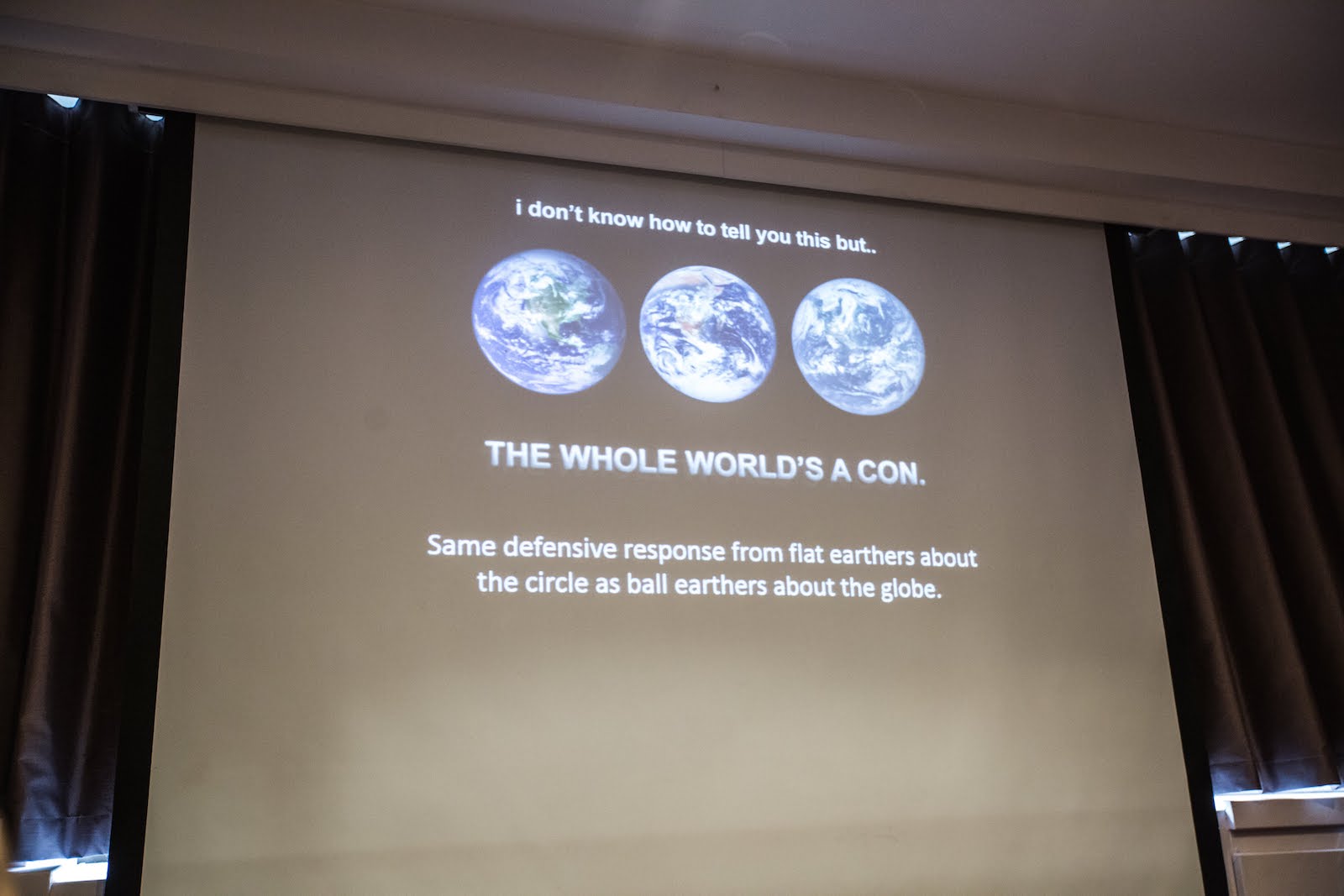
One speaker talked at length about the moon, and how its orbit proved the Earth couldn’t be spherical, which seemed a little counterintuitive.

Another talked about how the Egyptian pyramid structure points toward clues that the Earth is a flat diamond shape, supported by pillars.
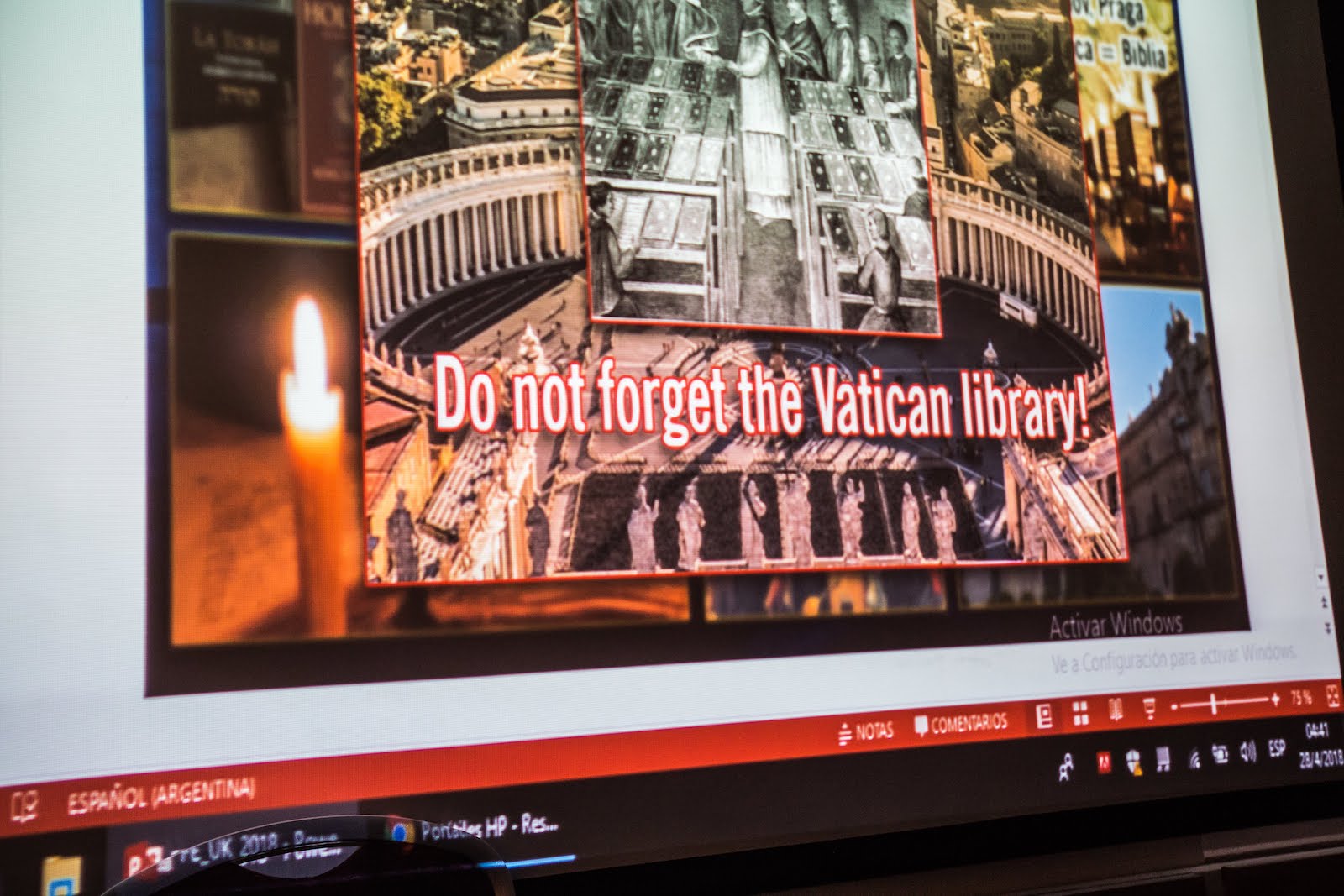
Between sounding off about the Vatican and the fact the establishment has indoctrinated us to believe all sorts of things, including that the Earth is a sphere, a third speaker suggested that cancer is caused by negative emotions and argued that dinosaurs didn’t exist.

I’m not going to pretend to know anything more about science than what I was taught in my GCSE Physics class – and I’m actually fairly susceptible to certain conspiracy theories – but “Egyptian pyramids are a clue the Earth is supported by pillars” and “bad vibes give you cancer” both sound like a bit of a reach to me.
So how do people come to believe this stuff? For my mum’s part, it was after watching some YouTube videos and realising that “with all this movement, water stays flat, calm and reflective to the point of being a perfect mirror, something that is not possible on a curve”.
But what about the people at the convention?
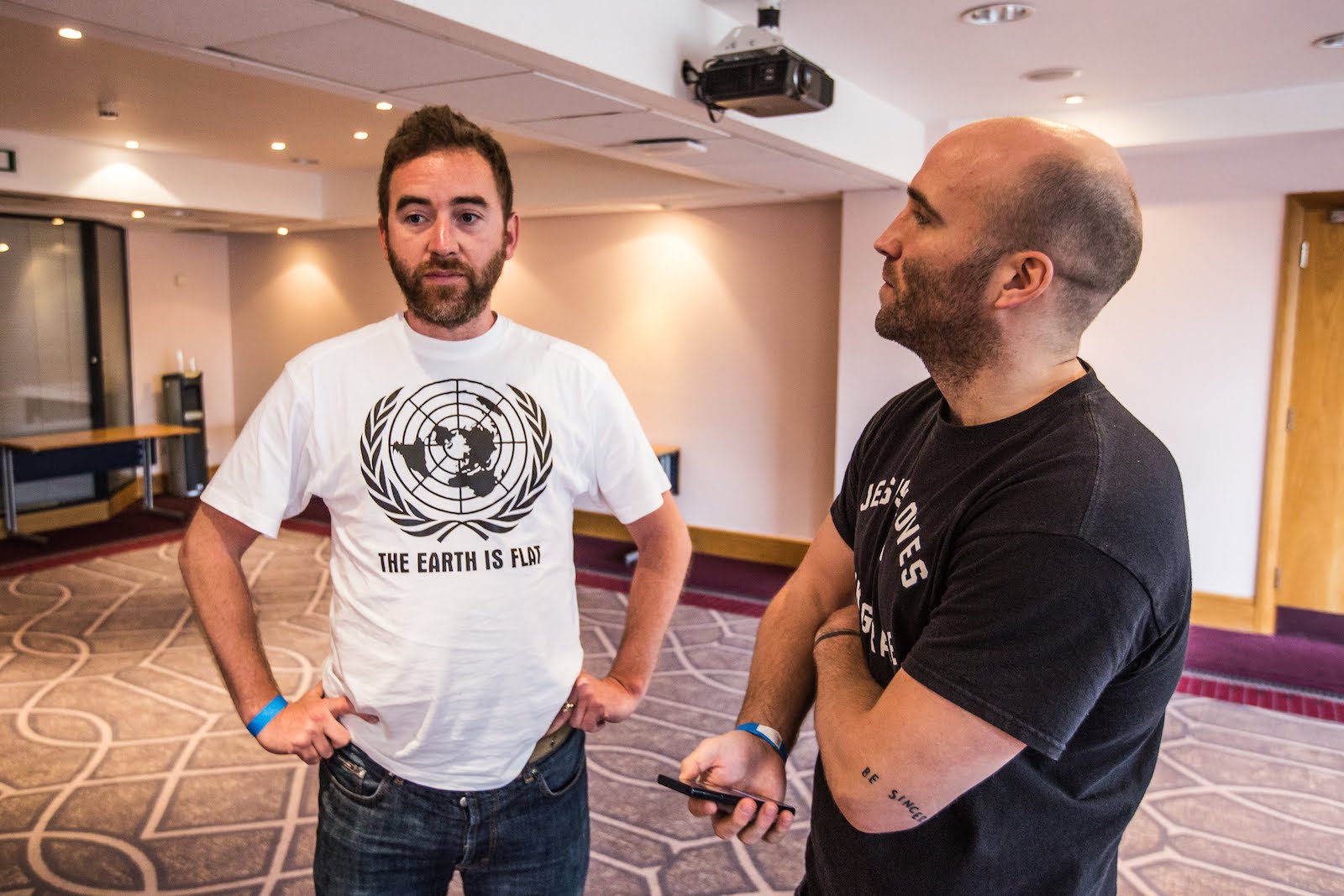
“I got into Flat Earth around when Trump came out,” explained Steve, who was wearing a snazzy Flat Earth T-shirt. “I started looking into Hillary, then [the debunked conspiracy theory] Pizzagate, around March, 2017. [Trump] was the catalyst to seeing that maybe there was a mass indoctrination going on – he kicked off my research into the Illuminati and the deep state. It took me about three months to get my head around it, and six months to accept it, and now I can really know we’re not on a spinning ball.”
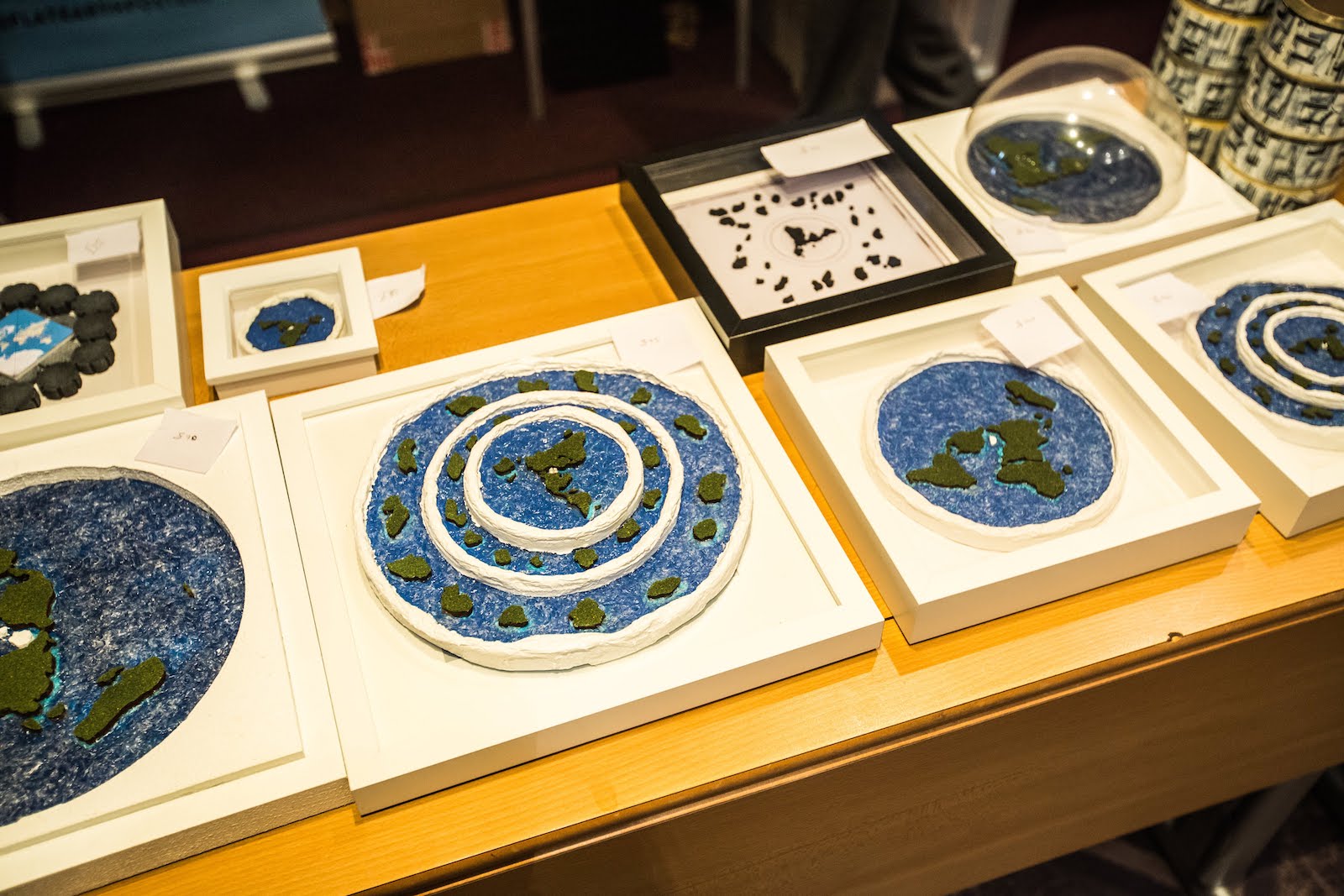
Like Steve, many of the people I spoke to seemed generally predisposed to believing conspiracy theories, or at least questioning the official version of events. And most – like my mum – also had their lightning bolt moment of realisation while watching a YouTube video.
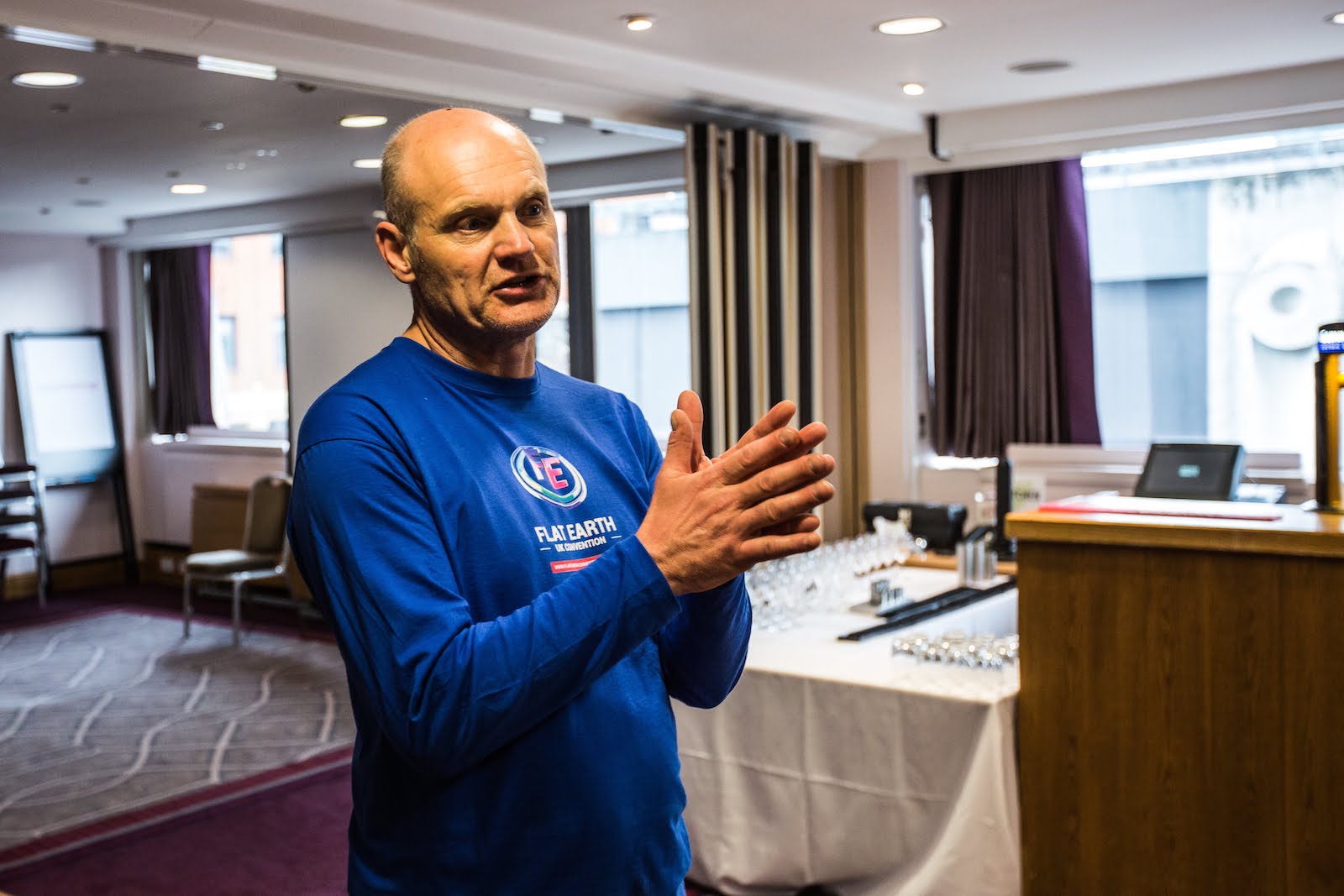
“I think conspiracy theories like 9/11 and the fake moon landing keep your mind receptive and take you on this new journey towards the truth,” Gary John, the event organiser, told me. “When you look at the moon landings, what you notice is: when you look at what you’ve been shown in the past, you think, ‘Hang on a minute, I’ve noticed a bit more.’ It’s almost like you read a book and you don’t understand it, then two years later you read the same book again and you do understand it. The book hasn’t changed – it’s the same words – but you’ve changed. So [Flat Earth] made me more skeptical, more aware.”
One more recurring theme was that, like Gary, many attendees and speakers got into Flat Earth in 2017. Another was that they all seemed to have a lot of time on their hands – so much so that it was almost a point of pride.
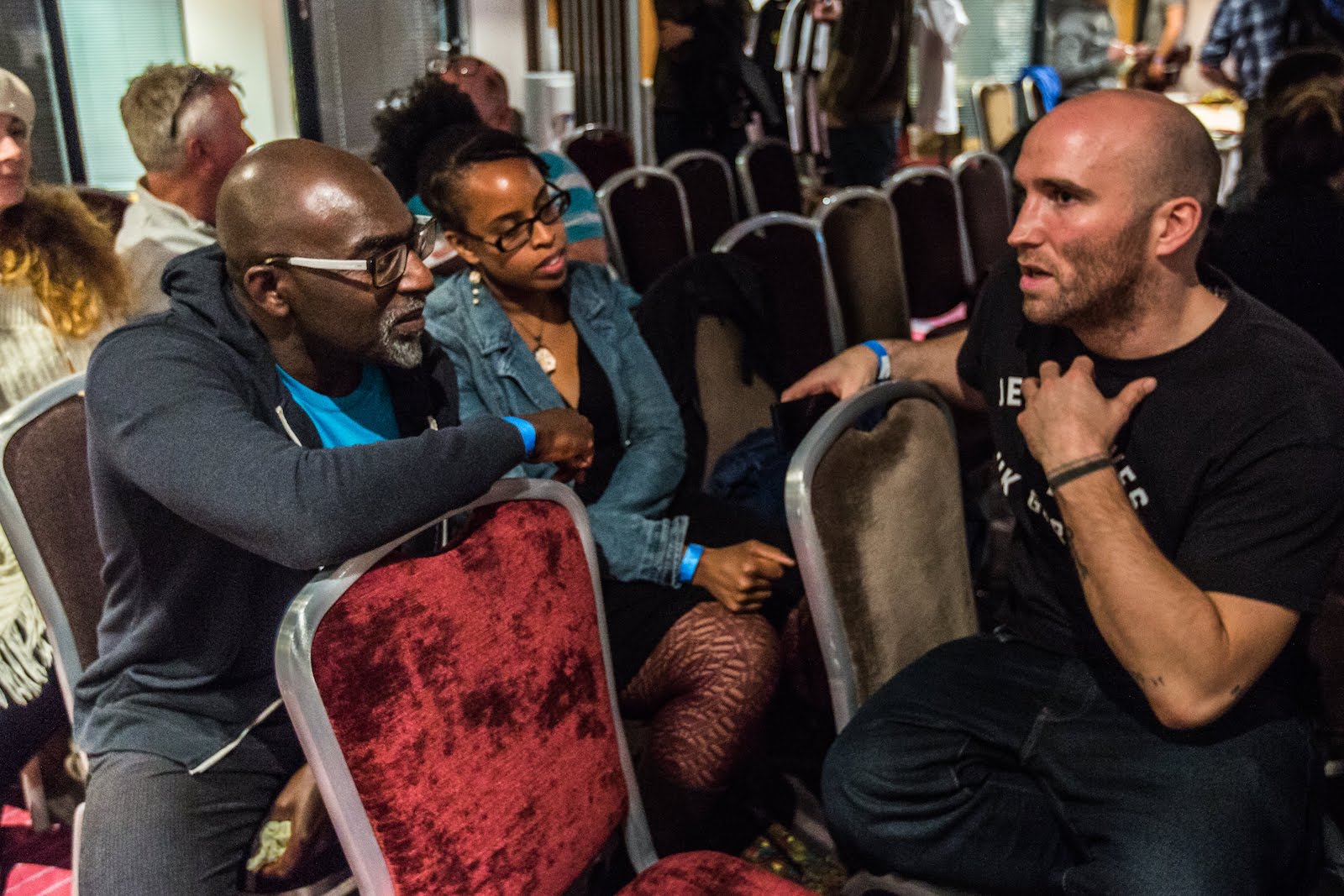
“I think [Flat Earth theorists] tend to be people who have time to research things for themselves. When you have jobs and families, you just don’t have the time to sit down and think about things in a deeper way,” explained Darren, who was there with his partner Fiona.
Fiona continued: “I think, being African-Caribbean, you tend to live to a certain extent on the outskirts of mainstream society, and it’s something the majority of white people don’t experience,” she said. “Many things that have happened to me personally, the way you regard the world, the way the world regards you, it puts you in that mode anyway, questioning things, because you’re forced to question… culturally, there is always a question mark, so you take nothing for granted.”
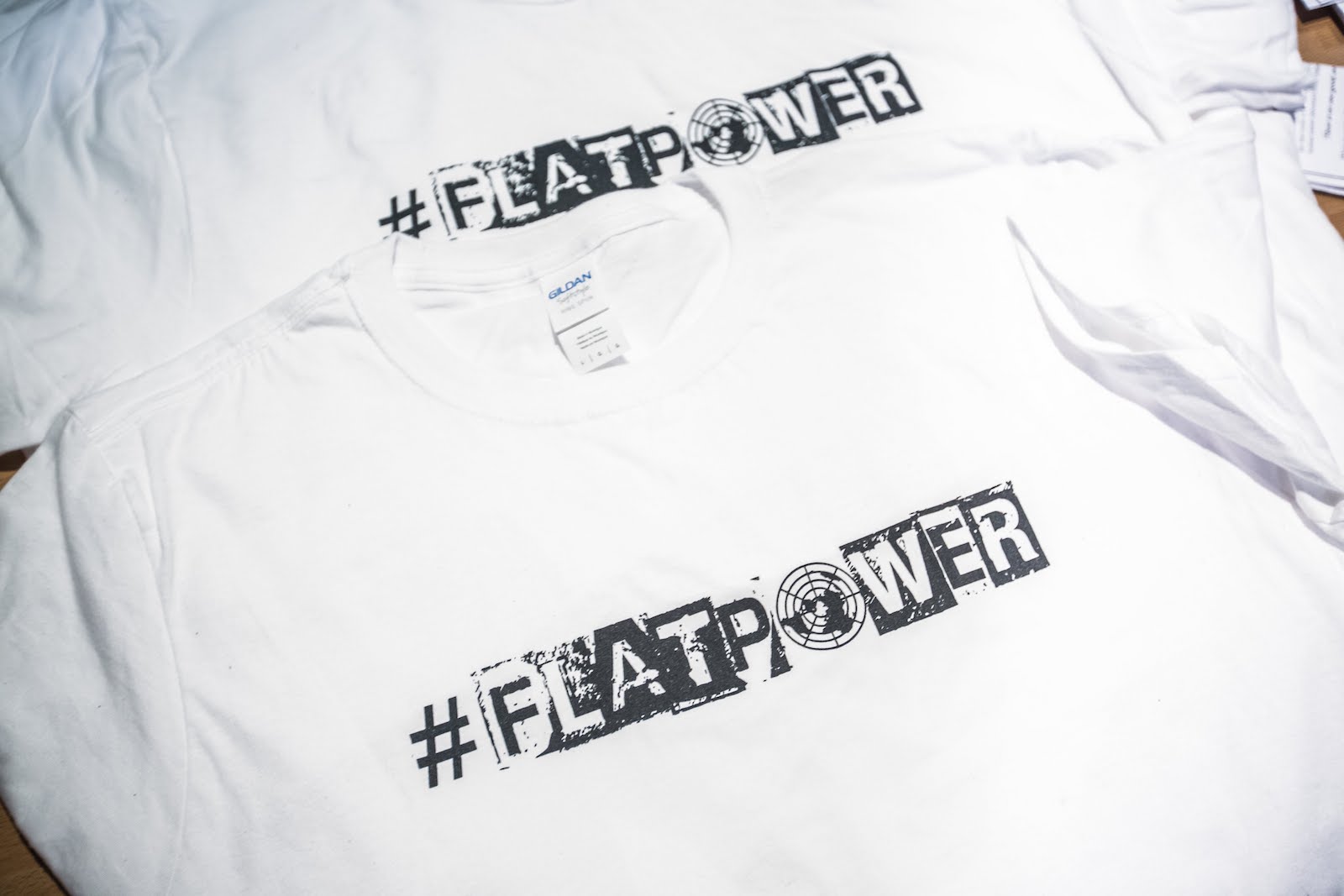
That was probably the most reasonable thing I’d heard all day: if you’ve been marginalised and feel like you’ve been lied to by institutions and people you’re supposed to automatically trust for much of your life, why should you trust what any of them have to say?

“Power has always been taken away from the people – that’s the way the world is going – and this is one of those things where we’re taking the power back: we are the centre of it, and we’re not being ripped off,” said Sarah, who was selling Flat Earth T-shirts. “They’ve got control of your reality, your perception and even the way you are. And the story is so flimsy from day one – like, how did we all believe it? It’s just conditioning from an early age.”
Speaking to attendees, it seemed like many found some kind of solace in Flat Earth theory. It gives them a sense of power over their destiny; control over the both minor issues in their lives and the existential ones; the belief that they’re onto something the rest of us aren’t, and the sense of satisfaction that brings.

“It’s been a positive – a massive one, really,” explained another Steve, who got into Flat Earth after losing his job and being told by the Job Centre to watch YouTube videos on how to be more employable. “I believe in myself again, rather than everything I’ve been told.”
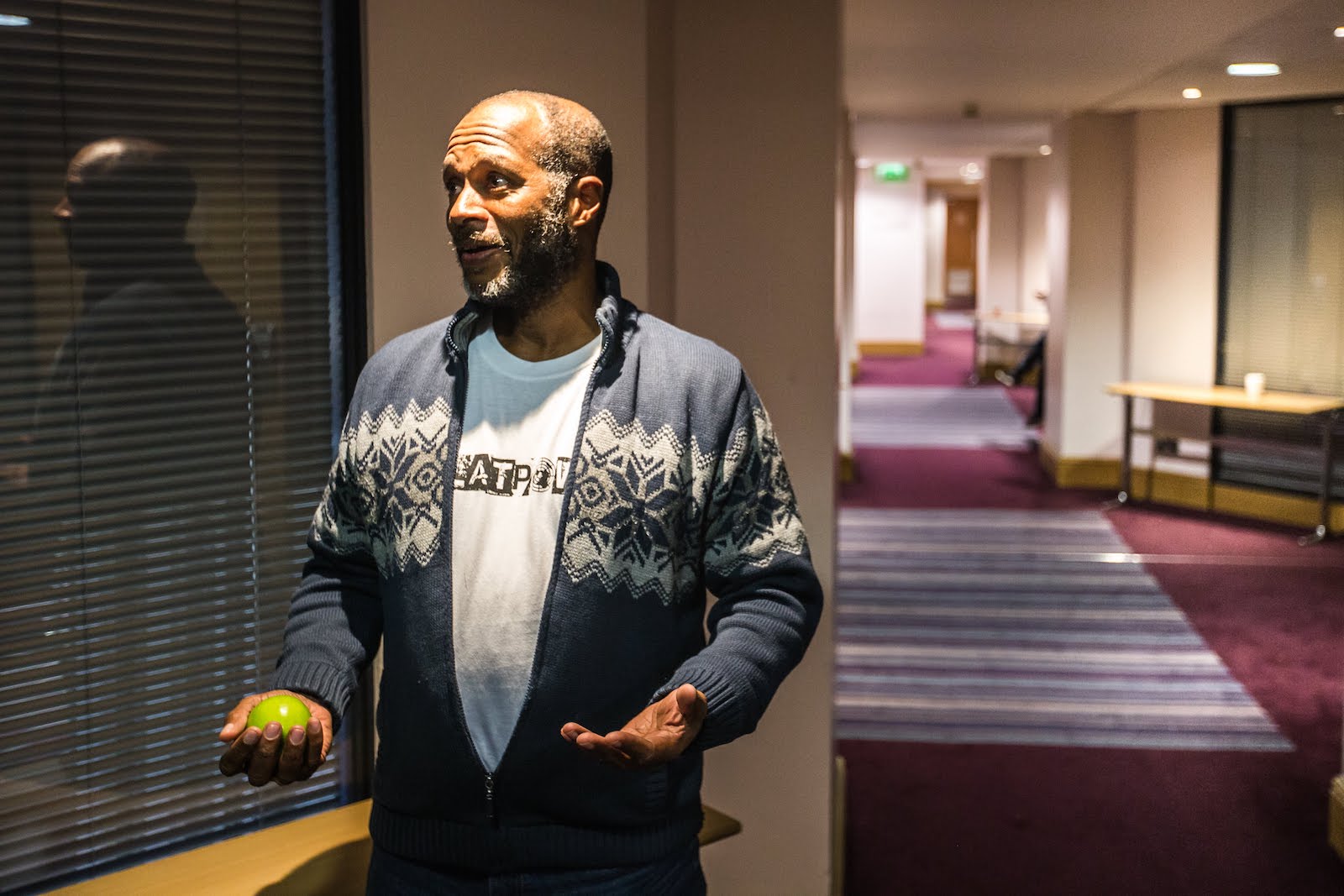
“You either allow it to change your life, or you live a lie,” added Allegedly Dave, who now travels the world benevolently helping people out with their life problems. He believes climate change is a fraud, and in drinking your own urine. So how has Flat Earth changed his life?
“There’s no tangible changes you make; it’s more mental,” he explained, staring deep into my eyes. “The fear of things, like asteroids destroying the Earth, or space stations falling down… you know, it’s bullshit, so it removes fear.”
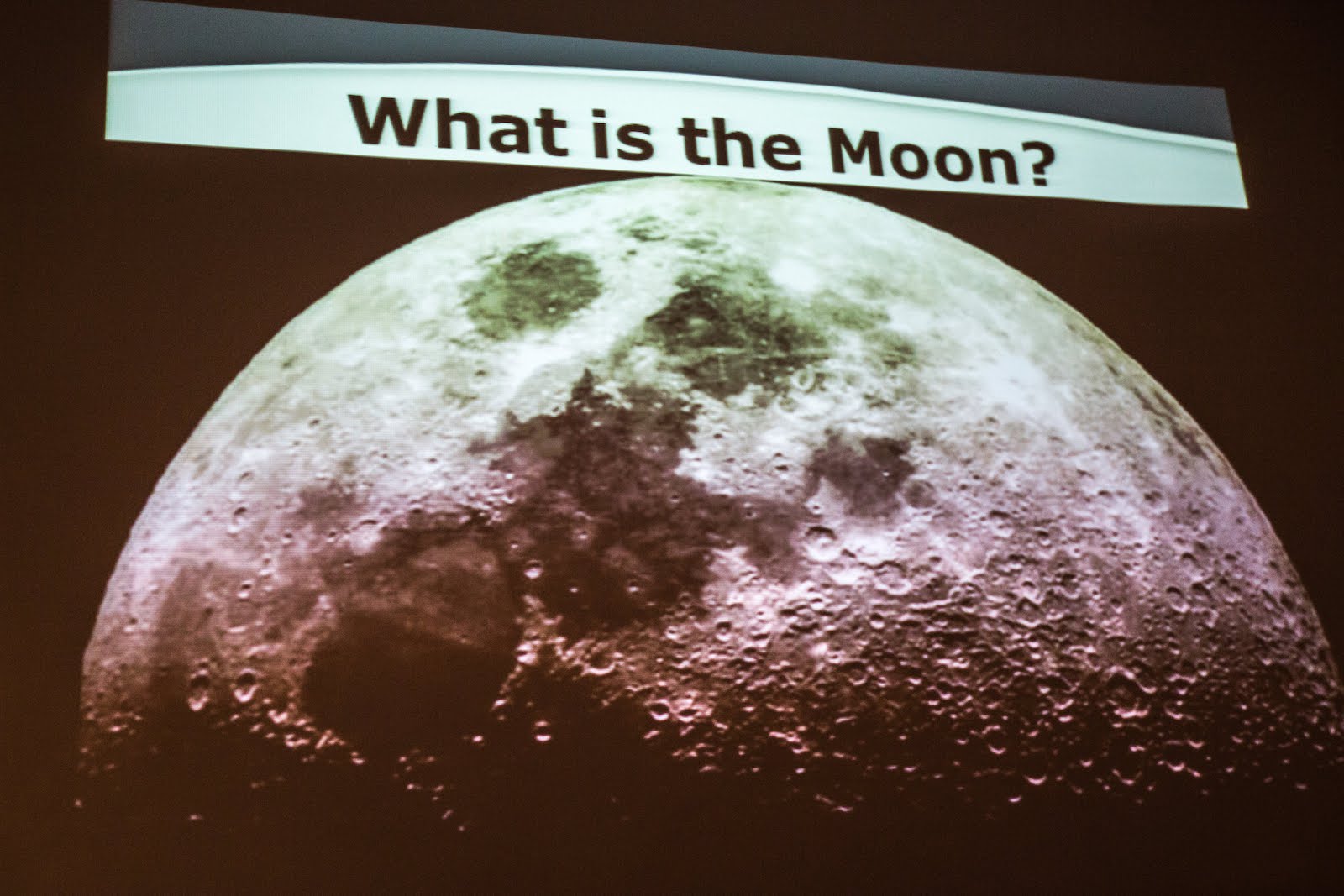
With that, I thought I’d got to the bottom of what attracted all these people to the Flat Earth theory. Through believing, they have gained a sense of order to their lives – an alternative belief system; a crutch, almost, in much the same way faith can help religious believers feel more secure about the world and their place in it. And, in its essence, there’s nothing too wrong about that. Where it becomes problematic is the general distrust for modern science – a very helpful thing in all of our lives, and something you’d be actively harming yourself to reject.
Luckily, while my mum might believe the Earth is flat, she’s not on the “bad moods cause cancer” vibe quite yet.
More
From VICE
-

Martin Harvey/Getty Images -

Screenshots: Trigger, Bandai Namco Entertainment -

deystudio/Getty Images -

Screenshot: The Indie Game Awards
